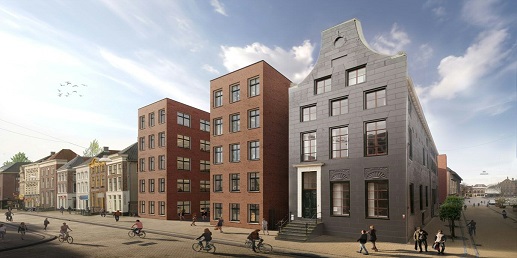University, Faculty and City

The University of Groningen
The University of Groningen is an internationally oriented university with a rich academic tradition. Since the establishment in 1614, the university has brought forward striving academics, like the first female student, the first Dutch astronaut and various Nobel prize winners.
Geographically, the University is rooted in the Northern part of the Netherlands, a region very close to its heart. We connect education and research with sustainable and economic processes within society. This comes together in the three focus areas of the university: Energy, Healthy Ageing, and Sustainable Society.
The Faculty of Law
Size and Scope
The Faculty of Law of the University of Groningen is a modern, internationally oriented institution that has existed for nearly four centuries. Since it has the ambition to measure itself with the best law faculties in Europe, advanced systems of quality control have been implemented to continuously improve the Faculty’s research and education. And although the Faculty has grown to become one of the largest law faculties in the Netherlands, it has kept its friendly and informal atmosphere and its concern for good relations amongst its staff and students.
The Faculty offers the entire range of law subjects and a large variety of specialized courses. Approximately 5,000 students study here under the supervision of 38 full time professors, 18 professors holding a special chair, 6 visiting professors and 220 full time staff members (152 academic teaching staff members and 70 administrative staff members). Each year approximately 950 foreign students stay for a term or a full year of study. Over 75 courses are taught and examined in English.
Research: governance perspective
A sustainable society requires that laws and dispute resolution, in short the legal organization of a society, meet good governance standards. Research has shown time and again that this is necessary for economic growth, democratic development, and the prevention of social conflict in general. The Faculty of Law of wishes to contribute to sustainable societies – both in the Netherlands and abroad – by adopting a governance perspective.
Broadly intended, governance could be defined as decision- and policy-making within a group of persons or within an institution, or within a system of institutions. It means governing with or without the government, policy-making with or without politics. Speaking of good governance, one may argue that the best governance of an institution is the one which combines a maximum of efficiency with a maximum of democracy, transparency, accountability, sustainability, and respect for fundamental/human rights and the rule of law.
The seven programmes of the Groningen Law Faculty may be seen as the seven faces of a cube which content is good governance in the law. These seven programmes explore the development of national and supranational legal systems towards good or better societal governance, from seven different angles:
-
Effective Criminal Law
-
Law on Energy and Sustainability
-
Protecting European Citizens and Market Participants
-
User-friendly Private Law
-
Public Interests and Private Relationships
-
Public Trust and Public Law
-
Transboundary Legal Studies
In addition the Faculty has a long-standing reputation in several fields of public international law and specialised subjects such as administrative relations between individuals and the State; peace and security co-operation; constitutional institutions and their relationship; criminality in a changing society; socio-economic and company law; the principles of Roman Law; Byzantine law, and the interdisciplinary study of law.
The Faculty’s research is organised under the umbrella of the Groningen Centre for Law and Governance (GCLG).
Location
As of August 2023, the Faculty Law is located in the Röling Building, in the very centre of the city.
Ranking and accreditation
All university programmes supported by the Dutch government are assessed every five years. All Bachelor and Master programmes of Faculty of Law in Groningen have full accreditation, including the English-language programmes. This accreditation of the Groningen law programmes leads to a direct legalisation of the diplomas that are granted here in most countries in the world.
Groningen, the top of the Netherlands!
Groningen, an old but modern city of about 233,000 inhabitants, is the cultural, commercial and business capital of the province of the same name in the north of the Netherlands. It was founded over 950 years ago and is a centre of trade and transport, culture, education and science. It has two large hospitals (the University Hospital is one of the largest hospitals in the Netherlands), several theatres and museums, bookshops specialised in all European languages, and art galleries. Its industry includes sugar, tobacco and coffee factories, and the printing of schoolbooks.
Young at heart
Groningen is a University city; the presence of the University staff and students can be felt in all aspects of city life. But it is not only the University that leaves its mark. Other educational facilities, vocational training, art academy, etc. also give the city a very special and particularly youthful character. Over 50% of the inhabitants are under the age of 35.
Beautiful surroundings
The surrounding countryside offers many sights within easy reach: woods and meadows to the south, the Friesian lakes to the west, the sea, the islands, the dunes of the Wadden, tidal flats and the unique wetlands to the north. And what is more, it is only little over two hours by train to Amsterdam.
